
The Hulk Hogan sex tape lawsuit, financed by a guy who flinches at the prospect of humanity enduring, is not really my story to tell. I was merely an observer at the time. While I’m all too familiar with most of the key twists and turns in the very messy, very public trial that followed, I never worked at Gawker Media and wasn’t on the inside when it all went down.
It was the week after Gawker was finally forced to close in August 2016 that I first started editing Kotaku on the weekends. As a newcomer, that frustrating, outrageous, and absurd chapter in the site’s history was already starting to feel like a painful but distant memory. Little did I know that the aftershocks were still on their way.
Peter Thiel’s Hulk Hogan lawsuit technically only destroyed Gawker, but the damage didn’t stop there. On the occasion of the wrestling star’s death this week, the unexpected though not always unintended consequences have never felt more clear, though their enduring and pernicious impact on Kotaku may seem less obvious. What does a site about video games have to do with a nine-year-old blip in the history of online media?
The world doesn’t need another retread of the lawsuit itself. Plenty of those have already been written, including by the people who lived it. The facts are simple enough. There was a tape of Hogan, real name Terry Gene Bollea, having sex. Gawker posted a brief portion of it online. Bollea, with $10 million in backing from Thiel, a Silicon Valley nut with a grudge, sued in a friendly Florida court where a jury eventually awarded the wrestler $140 million in damages, more than DuPont is currently paying for polluting an entire town’s water supply with forever chemicals. A $50 million appeal bond all but prevented the company from continuing to fight the lawsuit, even after evidence that may have helped it on appeal later leaked publicly.
The entire affair ended up being a prescient window into the current cultural moment in two ways. For one, it emboldened rich people to exploit the legal system to settle scores with media members they didn’t like over unflattering or embarrassing coverage. What some critics considered just deserts for an irreverent website caught out over its skis now forms the basis for media companies and others speedrunning settlements with people like President Trump to avoid making life harder for themselves.
Secondly, the trial forecasted just how stupid things were about to get. One clip from it circulating around this week following Bollea’s death shows him trying to explain to a jury why Hulk Hogan had a 10-inch penis but Bollea himself did not. There was the moment when the judge in the case allowed one of the jurors to ask the then-Editor-in-Chief of Jezebel whether she had slept with Gawker owner Nick Denton to get the job. It was unclear what bearing that would have had on the case. Also, Denton is gay. Every day in our political life is now this stupid, and with way more at stake for everyone involved.
Then there’s the bizarre trajectory the whole circus ultimately sent Kotaku itself on. It was sold at auction along with its non-Gawker sister sites to Univision, the Spanish-language broadcasting company that was then mounting a confused and ill-timed foray into digital media. Left mostly to its own devices, Kotaku briefly reached its highest headcount ever in 2018.
Thanks to the shifting whims of distant CEOs, the relative honeymoon was short-lived. A year later, it was sold to private equity firm Great Hill Partners and a Forbes.com washout named Jim Spanfeller. The new company was called G/O Media, short for Gizmodo/The Onion. Spanfeller told us in his very first meeting that he came up with it on a napkin just before the deal was finalized.
That anecdote proved a harbinger for how carelessly the websites themselves would be treated (“stick to sports”) over the subsequent years. I can tell you from experience that Spanfeller’s management style was an unusually disqualifying mix of ignorance, pettiness, bullying, gaslighting, and perversely ill-informed micro-management. I cannot, despite the dozens of hours I’ve wasted contemplating it, tell you what the logic behind any of it was.
What it achieved, however, was the slow, painstaking disfigurement of Kotaku amid an unceasing exodus of beloved colleagues, cuts to resources, and interference in its day-to-day operations (“stick to guides”), which have served millions of readers year-in-and-year-out for over two decades now. Some find it is easy to blame COVID, unions, and the hollowing out of the internet by tech monopolies for all of these things. Funny how the ruler-of-your-own-destiny crowd turns to systemic explanations when their failures start piling up all around them.
Who knows what exactly the future might have held if Bollea had lost the 2016 sex tape trial? But I would be willing to bet the house we would never have been sold to fucking Jim Spanfeller. Bollea’s death will mean different things to different people. To me, it will mark the end of one of the most idiotic storms Kotaku has ever weathered, which is saying something. July is also the month the site was sold to new owners Keleops, reuniting it with at least one of the other old Gawker sites, Gizmodo. I don’t like to piss on people’s graves, but I do like to toast the future, and Kotaku’s is finally one I’m looking forward to again.
.